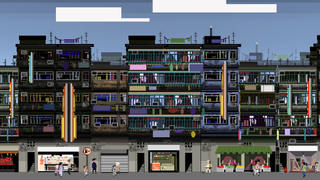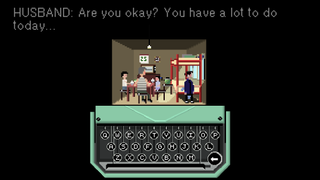In Oblige, life in 1970s Hong Kong is menial and controlled with a typewriter
A simulated typewriter, mapped to your keyboard, shows you what life is like through a language barrier.

Oblige's Hong Kong is gorgeous. The city's famously congested streets are rendered in blocky pixel art—endless rows of sunbaked tenements stacked on top of cramped grocery stores, barber shops, and laundromats. It breathes with the cresting of the day. When I walk my overworked, underpaid housewife's sore feet back from an afternoon's worth of errands, the families on the block are pulling steel curtains down in front of their storefronts. It's dinner time.
Jocelyn Kim and Ivan Tsang are 21-year-old undergrad USC students, and they cooked up Oblige as a tribute to their own immigrant lineage—Tsang for his Chinese grandmother, Kim for her Korean mother. As I mentioned above, you play as a housewife in Hong Kong in the late '70s—when the island was still under British authority. Oblige takes place over the course of five in-game days. Each morning you wake up and hold the tab key to check your to-do list and get to work. It's menial stuff—laundry, shopping, and cooking—all while your husband is at work and the kids are at school.
Tsang and Kim cite Cart Life and Papers, Please as influences, two pioneering designs that simulate the art of scraping by, and formally reject the traditional power fantasies inherent in games. Playing Oblige is all dictated through a typewriter made up of random letters pasted at the bottom of the screen. That typewriter is directly mapped to your keyboard, so typing "L" might give you "A," "M" to "Y," and so on. Occasionally the game will ask you to type out a response in conversation, (it's usually something docile and obedient, like "yes I understand,") and the player is forced to hunt for the right keys to parse out a readable sentence.
It's super tedious and frustrating, and that's exactly the point. Kim and Tsang wanted to mirror the sensation of struggling with a language barrier through Oblige's mechanics, so they took away something we all take for granted: our ability to type.
It's not just conversation. Everything in Oblige is filtered through that typewriter. When I cooked dinner for my family, I was forced to tenderize chicken and soak rice through a bombard of displaced letters. When I did the laundry I was asked to repeat my housewife's inner thoughts as she mixed the soap and water—"Husband or Son" as I stared at a pair of blue jeans. "Am I Happy?" a few moments later. Technically, these are minigames, but the joy of a normal interlude replaced with a grim, anguished, dutiful monotony.
"[For the cooking] I was looking at Cooking Mama, and thinking 'what is the worst version of Cooking Mama?'" says Kim, "Just making it not fun to play at all."

I played through Oblige's first day. Kim and Tsang promised me that over the course of the game's hour-long run, the housewife's schedule gets busier and you'll start running into time-sensitive choices that affect the overall narrative. I wouldn’t expect anything too dramatic, though. Oblige is about an ordinarily hard week in an ordinarily hard life, presented with empathy and gratitude. It's available for free with an encouraged donation right now on Itch.io.
The biggest gaming news, reviews and hardware deals
Keep up to date with the most important stories and the best deals, as picked by the PC Gamer team.

Luke Winkie is a freelance journalist and contributor to many publications, including PC Gamer, The New York Times, Gawker, Slate, and Mel Magazine. In between bouts of writing about Hearthstone, World of Warcraft and Twitch culture here on PC Gamer, Luke also publishes the newsletter On Posting. As a self-described "chronic poster," Luke has "spent hours deep-scrolling through surreptitious Likes tabs to uncover the root of intra-publication beef and broken down quote-tweet animosity like it’s Super Bowl tape." When he graduated from journalism school, he had no idea how bad it was going to get.
Most Popular



